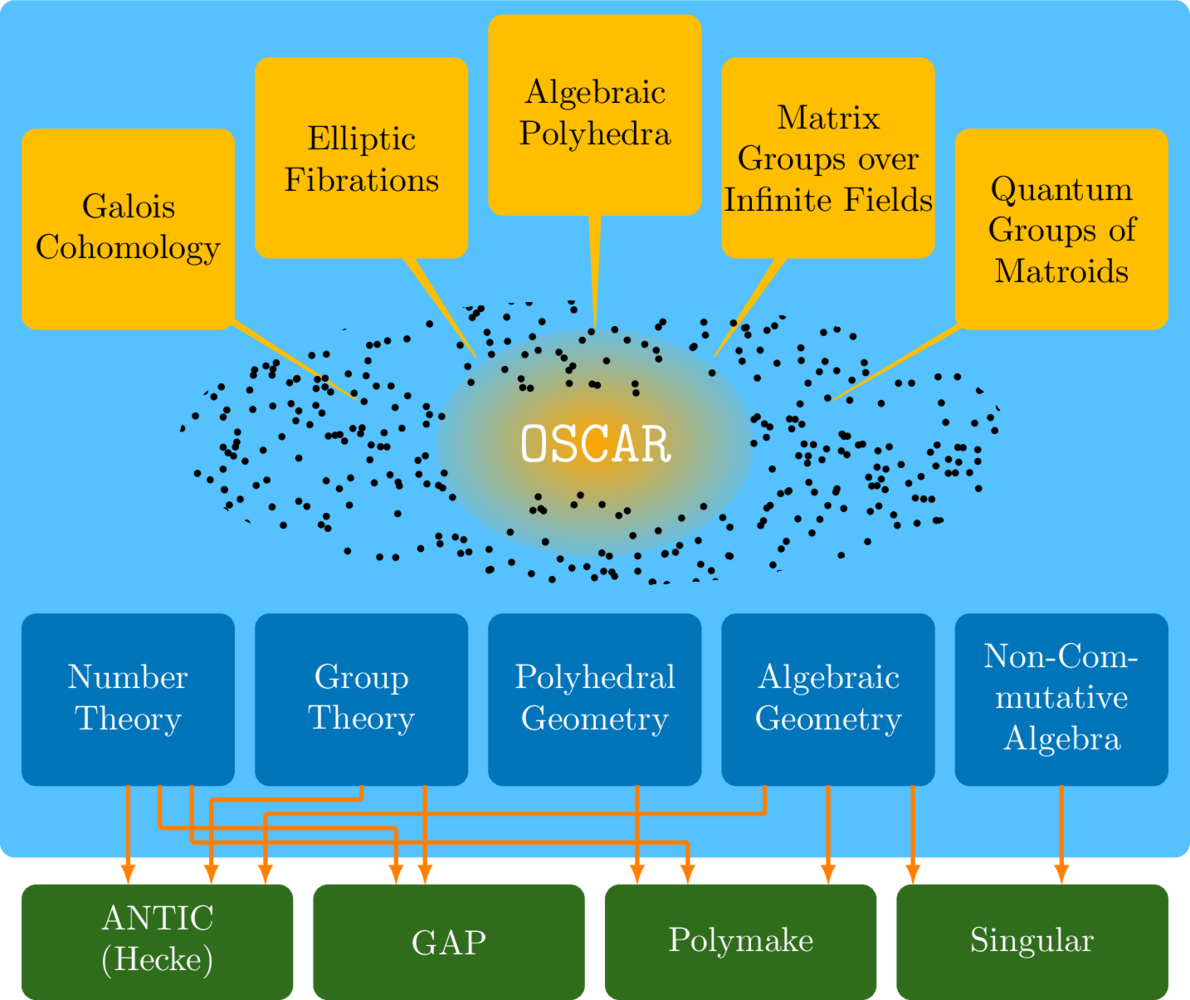OSCAR is an Open Source Computer Algebra Research System written in the Julia programming language. It provides a unified, high-performance framework for computations in algebra, geometry, number theory, and polyhedral geometry. OSCAR builds on the capabilities of four major systems: GAP, Singular, Polymake, and ANTIC, whose functionality is provided by Hecke, Nemo, and AbstractAlgebra. By combining these specialized tools under one umbrella, OSCAR enables workflows and mathematical functionality that go far beyond what each system offers on its own. We elaborate on these cornerstones below.
Through deep integration via Julia, OSCAR allows mathematical objects from different domains to interoperate seamlessly. This empowers researchers, developers, and students to construct, manipulate, and compute with sophisticated algebraic and geometric structures in a modular, extensible, and expressive environment.

The OSCAR system connects advanced mathematical computations with the power of multiple domain-specific tools. At the top, sample applications—ranging from Galois cohomology to quantum groups of matroids—illustrate the breadth of OSCAR’s capabilities, symbolized by an idea of clouds surrounding “OSCAR”. Beneath this, five core disciplines—number theory, group theory, polyhedral geometry, algebraic geometry, and non-commutative algebra—form the mathematical focus of the system. These domains are linked via arrows to the underlying software packages that serve as computational backbones, reflecting OSCAR’s design as a deeply integrated and extensible research system. While the current focus is on these five mathematical domains, OSCAR is built to grow and evolve with the mathematical community.
Deep Integration: GAP, Singular, Polymake, and ANTIC are embedded into OSCAR at a low level. Their functionality is exposed natively in Julia, and mathematical objects move seamlessly between them without conversions.
Unified Language: Julia serves as the single, high-level language across all components, enabling concise, expressive, and efficient code in a modern mathematical environment.
Interoperability: OSCAR supports mixed-domain workflows—allowing, for example, algebraic, geometric, and number-theoretic computations to be composed naturally within the same session.
Research-Oriented: OSCAR is designed for mathematical research. It supports precise, reproducible computations and is actively developed by and for the academic community.
Modular and Extensible: OSCAR’s architecture encourages contributions. New packages and algorithms can be added easily, benefiting from existing infrastructure and interoperability.
Julia is a fast, modern, open-source language tailored to numerical and symbolic computing. It offers:
At the heart of OSCAR are four powerful, domain-specific computer algebra systems. Each contributes unique strengths, and their deep integration within Julia makes OSCAR a unified platform for advanced mathematical computation.
The ANTIC cornerstone is comprised of various Julia-based packages, providing comprehensive support for exact arithmetic and linear algebra as well as algebraic number theory.
Together, these packages provide the computational backbone for OSCAR’s number-theoretic and algebraic capabilities — from basic arithmetic to advanced structures in algebraic number theory and arithmetic geometry.
GAP specializes in group theory and discrete algebra. It offers a high-level language, a rich library of functions, and over 120 contributed packages. Through GAP.jl, GAP is seamlessly available in Julia and thus forms the foundation for OSCAR’s algebraic capabilities.
Polymake is a software system for computations in polyhedral geometry, convex polytopes, polyhedral fans, toric and tropical geometry, and related combinatorial structures. With a hybrid architecture (C++ and Perl) and a rule-based evaluation system, polymake is highly extensible and efficient. Its full functionality is available in OSCAR via Polymake.jl, offering seamless access from Julia.
Singular specializes in computations with polynomial rings, particularly in commutative algebra, algebraic geometry, and singularity theory. It features advanced Gröbner basis algorithms and supports non-commutative extensions through PLURAL and LETTERPLACE. Singular is embedded into OSCAR via Singular.jl, exposing its powerful capabilities within Julia.
The functionality of Singular is complemented by AlgebraicSolving.jl, a package that adds robust support for solving multivariate polynomial systems using symbolic methods. Informally, it enables users to model and work with points on algebraic varieties; more formally, it provides tools for symbolic algebraic solving.
🚀 Installation Guide – Everything you need to install OSCAR 1.3.1 (released on 14 Mar 2025).
🎓 Tutorials – Interactive Jupyter notebooks to help you get started.
📚 Documentation – In-depth documentation and examples.
📙 OSCAR Book – A detailed guide to OSCAR 1.0, featuring code snippets and in-depth explanations.
📝 Release Notes of OSCAR 1.3.1 – released on 14 Mar 2025
🧑💻 GitHub Repository – Source code, issue tracking, and development discussions.
🤖 Contributing Guide – Learn how to contribute code, documentation, or ideas.
🤝 Contact & Support – Find ways to connect, ask questions, or get help.
🏛️ Funding – OSCAR is supported by the German Research Foundation (DFG) through the Collaborative Research Center TRR 195.”